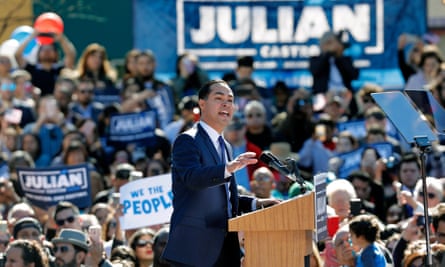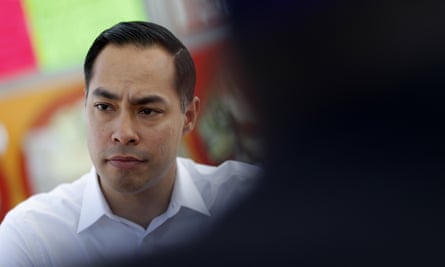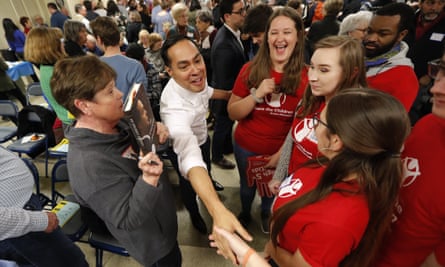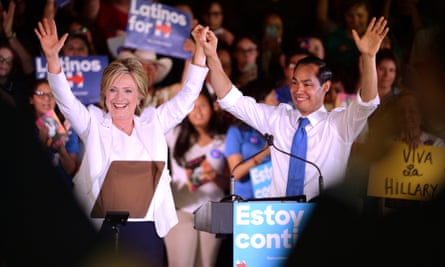Last June, at the height of America’s family separation crisis when thousands of migrant children were being wrenched from their parents’ arms and held in cages, Julián Castro drove through the blazing heat of the Rio Grande Valley to the Ursula detention center on the US-Mexico border. He stood outside the locked entrance to a building where separations were taking place, and was overcome by revulsion.
It was as if, he writes in his memoir An Unlikely Journey, “an American ideal had been desecrated. This was a wake-up call for the nation”.
The moment was all the more visceral for Castro because 96 years previously, some 250 miles farther north along the border, his grandmother Victoria had left behind the land of her birth and entered the US through the Eagle Pass crossing. Mamo, as Castro called her, was only seven at the time and had been orphaned a few days earlier, but she found a welcome reception and was eased into a new life in America.
The contrast between the cruelty of the treatment of the children in 2018 and Mamo’s experience in 1922 got Castro thinking. “How different my life would have been,” he writes, “if circumstances for immigrants almost a century ago had been more like they are now.”

His grandmother’s narrative has been deployed by Castro at key points in his emergence as a politician. The theme of the opportunity she gave him by coming to the US as a child ran through his speech to the Democratic National Convention in 2012 that propelled him on to the national political stage.
Now it is being put to use again as he frames his personal manifesto as one of the earliest candidates and the only Latino to declare a 2020 run for the White House.
The narrative is all the more sharply drawn in the age of Trump. When the Guardian interviewed Castro in Austin, Texas, last month he recalled his reaction to Trump’s incendiary remarks about Mexican criminals and rapists at the launch of his own presidential campaign in June 2015. “It both pissed me off and saddened me,” Castro said. “I knew how wrong he was because I knew my own grandmother and how much she contributed to this country.”
He might have added that one of Mamo’s most notable contributions to America was Castro himself, a soft-spoken, highly educated graduate of Stanford and Harvard law school who went on to become mayor of San Antonio, Texas, and later the housing secretary in the Obama administration. Castro’s presidential candidacy is in itself an implicit rebuke to the current White House incumbent: with his dapper suits and immaculate grooming, Castro is as far from the nightmarish caricature of the immigrant rapist that Trump has invoked as any third generation Mexican American could be.

Now Castro, 44, is trying to turn that contrast into presidential capital. But in the already exceptionally crowded field of Democratic hopefuls, he is struggling to be heard. While Pete Buttigieg, the mayor of South Bend, Indiana, was awarded an individual CNN town hall, and has seen his standing in the polls duly rise, Castro, the former mayor of a city with 15 times the population, not to mention his federal government service, had to settle with a modest CNN interview.
Less than three months into his campaign, he is already facing probing questions: can his message be distinctive enough to stand out? Can he mobilise Latino voters to turn up for the primaries in large enough numbers to make an impact? Does he have a shot at fulfilling Mamo’s narrative as the first Latino president of the United States?
From San Antonio to Washington
Julián Castro was born and raised in the West Side of San Antonio, a Hispanic area populated by poor, working-class Mexican American families.
Apart from Mamo, two individuals dominated Castro’s childhood and helped steer his political career. His mother, Rosie Castro, not only raised a family as a single parent (his father Jesse Guzmán left when Julián was eight years old) but was also an impassioned advocate of Hispanic civil rights.
As a proud Chicana and activist with La Raza Unida, a Mexican American political party founded in Texas in 1970, Rosie Castro helped overcome electoral barriers to Latino representation in San Antonio and narrowly failed to win election to the city council. Castro describes her as a “hell-raising civil rights fighter”, recalling how she exposed him to campaigning from the age of four.
Rosie also instilled in him the conviction that education and hard work were the way to overcome disadvantage and fulfill one’s potential. That message was equally drilled by her into the second towering influence in Julián’s life: his identical twin brother Joaquin.

Julián is the older of the pair and remarkably – given that they were born just one minute apart – his seniority is still evident today. Julián is the natural executive of the two, the decision-maker; Joaquin is a little more extroverted and outspoken, the deliberator.
Despite such fine nuances between them, the duo are inseparable. Following their mother’s edict, they worked hard and secured places together to Stanford, and then Harvard. The first significant time they spent apart was when Julián interned in the White House one summer while Joaquin joined a law firm back in Texas.
Once they were done with higher education they both embarked on careers in politics and to this day they continue to follow parallel tracks: Julián, a city councilor, mayor, federal housing secretary, presidential candidate; Joaquin, a member of the Texas house of representatives, US congressman, now contemplating a US Senate race against Republican John Cornyn.
Along the way, they have consistently had each other’s backs. It is no coincidence that Joaquin is Julián’s presidential campaign chairman.
“If you are in the orbit of the Castro twins you quickly come to realize that they are each other’s own best adviser – it doesn’t matter who else is around them, they will always listen to each other first,” said Jaime Castillo, a close aide to Julián Castro in both his roles as mayor and housing secretary.
The other characteristic that stood out for Castillo was that Castro never forgot the tribulations of life on San Antonio’s West Side. “He might wear tailored suits, but he was always firmly rooted and committed to policies that he thought would advance the kind of neighborhoods like the one where he grew up,” Castillo said.
As mayor, Castro set out to do something about San Antonio’s record as the most unequal city in America. He created Café College, a free advice service for low-income students that helps them apply for college.
On a bigger scale, he followed his mother’s belief that education was the route to opportunity by creating an ambitious early learning scheme called Pre-K 4 SA, managing to persuade taxpayers to fund it through an increase in sales tax of an eighth of a cent per dollar. The program now provides more than 2,000 four-year-olds with high quality all-day schooling.

Castro’s leadership in San Antonio brought him to the attention of Obama and an invitation to be the first Latino to deliver a keynote speech at the DNC. In turn, that led in 2014 to him being offered the post of secretary of the federal department of housing and urban development (Hud), a job he held for the final two years of Obama’s presidency.
The Castro brand of eye-catching initiatives designed to widen opportunity for less advantaged communities can be seen again stamped on his brief spell at Hud. He founded ConnectHome, a partnership with internet providers to bring the digital web to people in public housing.
He also introduced new rules requiring housing authorities to combat segregation – an initiative that Ben Carson, who replaced Castro at Hud once Trump entered office, promptly scrapped.
Lourdes Castro Ramirez, who led the office of public housing under him, said that Castro viewed Hud as the department of opportunity. “His motivation was simple – he wanted to ensure that children and families had the chance to do better and to achieve their dreams.”
But his term in federal government was not without controversy. In April 2016 a coalition of 14 advocacy and civil rights groups, many of them Latino, issued a petition that made stinging criticisms of his handling of a federal program that claimed to help low-income homeowners facing foreclosure.
The alliance, led by the online Hispanic campaign presente.org, Color of Change and other groups, accused Castro of being in cahoots with Wall Street over the Distressed Asset Stabilization Program (DASP). The scheme, they lamented, was selling off properties at knock-down prices to the big banks and large private equity firms, putting homeowners at risk of being turfed out.
“Selling off our neighborhoods to Wall Street – at a steep discount – does not help keep people in their homes,” the petition said. The sense that he was too close to Wall Street was aggravated by the fact that the controversy erupted just when Castro was being sounded out as a potential running mate for Hillary Clinton, a politician with her own Wall Street problems.

In the end Clinton did not choose Castro. But the fall-out from the DASP controversy dogs him on the campaign trail. When asked about it, he points out that the program was created two years before he joined HUD, and that under his aegis several changes were made to the program that did actually help people remain in their homes.
An uphill challenge
The distressed asset dispute puts into relief one of the puzzles about Julián Castro – just how radical is he?
In San Antonio and at HUD he gained a reputation for competency and efficiency, for executive skills that improved lives, certainly, but were more pragmatic and practical than visionary.
Since he threw his hat into the presidential ring in January he has struck a much more overtly progressive pose. Like several of his Democratic rivals, he has embraced Bernie Sanders’ idea of Medicare for All designed to ensure that all Americans have healthcare.
On climate change, he has said he wants to take the US back into the Paris agreement on cutting greenhouse gasses and has made positive noises about the domestic plan for net-zero emissions, the Green New Deal. He has also attached himself to reparations for descendants of slavery, saying that he favors the idea of a national commission to explore the idea and criticizing Sanders for showing hesitation.
The list places Castro firmly on the resurgent left of the Democratic party. But how does that square with the image of Castro as the managerial pragmatist?
The Guardian put that to him in Austin. He said: “People didn’t know where I stood on a whole bunch of issues because when I was mayor and at HUD I wasn’t asked about them. I’m going to articulate a strong vision for the country’s future that people will see is genuinely what I believe, and I think it will catch on.”
His most distinctive set of policies involve immigration. As the first Latino to run a major bid for the Democratic nomination since Bill Richardson in 2008, he has been leaning on his Hispanic credentials as a point of differentiation.
His first campaign trip after launching his campaign in San Antonio was to Puerto Rico, the US territory whose 3 million Spanish-speaking US citizens can take part in the primaries but are deprived the vote in the presidential election proper. Last month he made a beeline for counties in Iowa with large Latino populations.
He travels to these Latino areas bearing the most robust immigration platform of any Democratic hopeful. He is proposing a Marshall Plan for Central America – an injection of resources and support for Honduras, Guatemala and El Salvador that provide the bulk of the migrants seeking to enter the US without visas – as an alternative to Trump’s wall.
On top of that he wants to see a pathway to citizenship cleared for the 11 million undocumented immigrants already in the US, and a humane approach to securing the southern border through technological innovation at entry posts.

Hispanic leaders hail Castro’s run as a major leap forward for a community that has for so long been ignored by presidential candidates. “You have to recognize that we are an afterthought, even though we are a huge block of 30 million eligible voters,” said Claudia Romo Edelman, an activist working to frame an Hispanic agenda for the 2020 election. “Candidates don’t focus on us, they don’t visit us, they don’t tour our businesses – so for Julián Castro to make us a primary part of his campaign, that is electric.”
Electricity was in the air last month when Castro spoke to 450 mainly Latino students at UCLA. The political scientist Matt Barreto, the cofounder of the polling firm Latino Decisions who organized the event, was struck by how fired-up the audience became.
“It suggested to me there’s an opportunity here for Castro to make the same appeal with Latinos that Obama did with African Americans,” he said.
That’s an uphill challenge though. The legendary “sleeping giant” of the Latino electorate has disappointed many Democratic candidates by failing to rise from its slumbers.
Against that tough historical record, Barreto points to a surge in Latino turnout in November’s midterm elections of 174% over 2014 figures. He also highlights the fact that California and Texas, states with enormous Hispanic populations, have both brought forward their Democratic primaries thus greatly increasing their electoral weight.
Castro conceivably has a shot to provide that final chapter of his grandmother’s narrative, if he can leverage his Latino heritage to his advantage. But first he has to stay in the game long enough for his voice to be heard.
